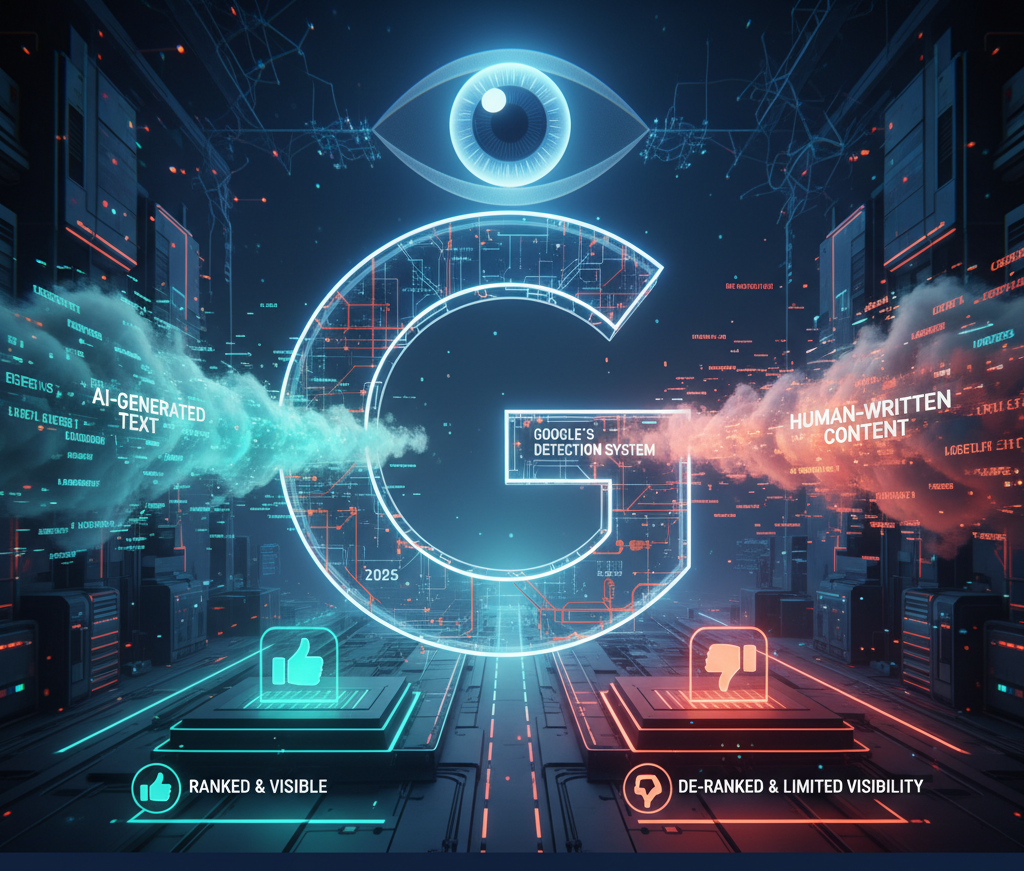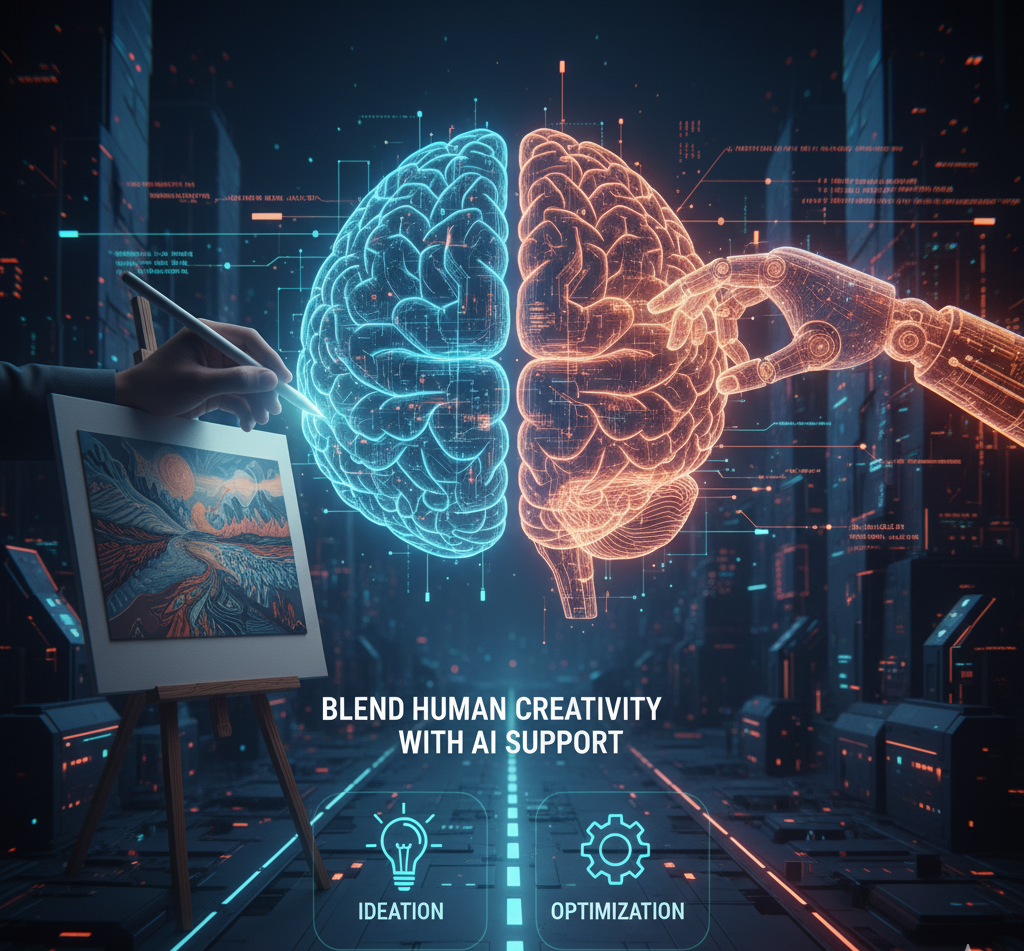Table of Contents
Introduction
So, can Google really spot AI content? This question has sparked quite a debate among marketers, bloggers, and SEO experts these days. With AI writing tools churning out millions of blog posts daily, creators are eager to find out if Google can identify AI-generated text and what impact it has on their rankings.
By 2026, Google’s position on AI content is pretty straightforward. It can indeed detect material written by AI using sophisticated algorithms, but it doesn’t just slap a penalty on it. Instead, Google favors high-quality, original, and user-focused content, no matter if it’s crafted by humans or generated with a little help from AI.
Can Google Detect AI Content?

1.Google’s Enhanced AI Detection Systems
Absolutely Google can detect AI content, and it’s getting better at it all the time. The detection process doesn’t focus on who wrote it but rather on the writing patterns, structure, and style used in the text.
Google’s algorithms are designed to spot synthetic or formulaic language, repetitive phrases, and overly predictable sentence structures all classic indicators of AI authorship.
While Google keeps its exact detection methods under wraps, it relies on several key signals to figure out whether content was generated by AI or penned by a human:
- E-E-A-T (Experience, Expertise, Authoritativeness, Trustworthiness)
- Originality and factual accuracy of the content
- User engagement metrics, like time spent on the page, bounce rate, and click-through rate
These elements help Google determine if the content whether human or AI truly meets user intent. Additionally, Google’s quality raters manually review any suspicious content and flag pages that seem low-effort or robotic.
Upgrade your skills with Us : Join Our Free Demo Session.
2.Common Traits That Expose AI-Generated Text
Even well-written AI content can show patterns that Google can detect. Below are some of the most common red flags:
| Indicator | Description | Impact on SEO |
| Repetitive structure | Uniform sentence length or structure | Decreases readability |
| Overuse of keywords | Forced or unnatural keyword placement | Hurts ranking potential |
| Robotic tone | Lacks emotional or contextual flow | Reduces reader engagement |
| Generic information | No unique insights or first-hand experience | Weakens authority and trust |
In short, Can Google detect AI content? Yes but what it truly penalizes is low-quality writing, not the use of AI itself.
How Google Handles AI Content
1.Quality Over Origin
When it comes to content, Google prioritizes quality over its origin. The key question they ask is simple: Does this content truly benefit users?
If your article, even if it’s AI-assisted, delivers accurate, original, and engaging information, it can rank just as well as something written by a human. On the flip side, if your content is thin, repetitive, or created just to game the SEO system, it risks being flagged under spam or content abuse policies.
So, using AI is totally fine as long as you sprinkle in some human expertise, editing, and creativity along the way.
You May Also Like To Read : How Generative AI is Changing Digital Marketing in 2025
2.Core and Spam Updates in 2026
With every algorithm update, Google keeps refining its ability to spot AI-generated content. The 2026 Core and Spam Updates have made this process ongoing, meaning low-quality pages are now flagged and downgraded in real time.
These updates focus on:
- Spotting mass-produced or unedited AI content
- Measuring user engagement and satisfaction
- Utilizing tools like AI-based content detectors to identify automated material.
This way, authentic, user-entered content stays in the spotlight, while thin or repetitive AI articles quickly drop in rankings.
Does Google Penalize AI Content?
The short answer? No — Google doesn’t penalize content just because it’s AI-written. Instead, they look at how AI was utilized.
AI-assisted writing is perfectly acceptable when it’s used to:
- Outline or brainstorm ideas
- Enhance readability or clarity
- Translate or summarize information
- Aid in research or data organization
However, it can hurt your rankings if you:
- Mass-produce a bunch of low-quality posts
- Spin existing text or recycle information
- Over-optimize for keywords without adding real value
In short, Google rewards intention and quality — not just automation.
Attend Our Free Demo Session.
Best Practices for AI-Generated Content
1.Blend Human Creativity with AI Support

While AI can speed up the writing process, it can never truly replicate human creativity or experience. The most effective content is a harmonious mix of both.
Here are some tips to help your AI-generated content shine:
- Take the time to edit AI drafts for tone, emotion, and depth of information.
- Infuse your writing with personal anecdotes, brand insights, and relevant data.
- Always double-check your statistics and reference trustworthy sources.
When you combine AI capabilities with human expertise, you create content that feels authentic and reliable—something that Google really appreciates.
2.Regularly Review and Refresh Your Content
Even top-notch AI-generated content requires regular check-ups. Make it a habit to audit your posts now and then to keep them accurate, fresh, and engaging.
Look out for:
- Any drops in rankings or impressions
- Sections that feel repetitive or outdated
- Missing data, visuals, or statistics
By updating AI-written articles with new insights and formatting, you signal to Google that your site is active, credible, and focused on user needs.
3.Focus on User Experience
At the end of the day, Google prioritizes content that genuinely helps people. Always write with your readers in mind, not just for search engines.
To ensure your AI-assisted writing meets Google’s quality standards, concentrate on:
- A conversational tone that feels relatable
- A clear structure with informative subheadings
- Unique insights that AI tools can’t easily replicate
- Visual elements like tables, infographics, and real-life examples
If your audience finds value in your content, Google will reward it with better visibility.
The Future of AI and Search
AI is definitely here to stay, and even Google is leveraging it to enhance the quality of search results. However, despite the rise of automation, Google’s core mission hasn’t changed: it’s all about providing accurate, helpful, and trustworthy information.
Looking ahead, the most compelling content will come from creators who can blend the art of human storytelling with the efficiency that AI offers. Those who treat AI as a valuable tool rather than a quick fix will find themselves at the top of search rankings.
Conclusion
So, can Google spot AI-generated content? You bet! But will it penalize you for using it? That’s a different story — only if the content is subpar.
Google’s ever-evolving algorithms prioritize E-E-A-T, originality, and helpfulness. These are values that savvy content creators can easily achieve by merging AI’s efficiency with their own expertise.
- To ensure your SEO strategy is future-proof:
- Use AI wisely and make sure to edit thoroughly
- Prioritize user intent and provide in-depth information
- Continuously enhance your content with fresh insights
In 2026 and beyond, success will belong to those who can strike the right balance between artificial intelligence and genuine human value.
Enroll for Free Demo Session







